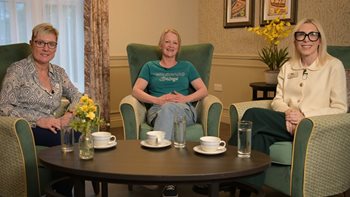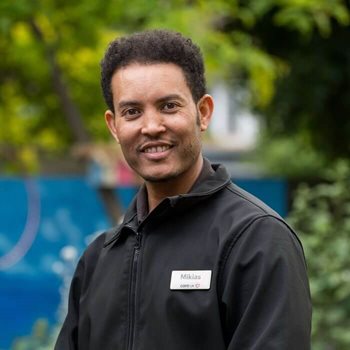Care UK wellbeing foundation supports more organisations using the arts to increase wellbeing of peo
Company news
May 31, 2016
The Care UK wellbeing foundation has announced its latest tranche of grants to help organisations that use the arts to support people, young and old, with a wide variety of medical conditions.
One recurring theme of the projects supported by the foundation is helping those with limited communication skills to share their experience of life with others.
Rosemary Harvey, Care UK’s assistant company secretary and wellbeing foundation board member, said: “When we established the foundation in 2014, we chose to focus on the arts because we wanted to attract projects that gave people a myriad of ways to communicate how they felt, how they experienced life and what they wanted people to know about them.”
“Wellbeing revolves around a feeling that we are accepted and understood for who we are. At our 114 residential care homes, our teams work diligently with individuals to ensure their care plans and activities reflect their interests, personalities and ideals. The projects we selected for support in this tranche reflect that ethos, with their determination to support the individual.”
Strokes are devastating for the people who experience them as well as for the loved ones who care for them. The physical effects can take a toll on a person’s communications skills and it can be difficult for someone to explain what they’re experiencing and how their world has changed. This has practical and emotional implications.
With this in mind, the wellbeing foundation board were delighted to offer a £2,000 grant to a pioneering project run by the South London Stroke Register (SLSR), based in the Stroke Research Team at King’s College London.
The visual arts project will see students from University of the Arts London working with some of SLSR’s research participants to capture their stories using videos, photos and sound clips. The artwork will then be exhibited online and across accessible community venues in south London.
SLSR’s research associate, Dr Jenny Cook, said: “This is a unique collaboration with 10 people from SLSR, most of who are over 65, working with young people with little or no experience of chronic illness or working with older people. Participants on the SLSR have also told us they hope that the art work will influence people’s understanding of what a stroke is and how it affects them.
“We hope that both groups benefit from working together and that people visiting the exhibition gain a clearer insight into how strokes affect people’s lives.”
The Board also selected the application of a second South London project that helps people with limited communications to experience joy and increased wellbeing. The Healthy Living Club is a small charity based at Lingham Court, an extra-care unit in Stockwell, Lambeth.
An all-day club that regularly attracts more than 40 participants runs on Wednesdays and includes activities as yodelling, rapping and tap dancing. A breakfast and keep-fit club runs on Mondays mornings, and a monthly art and crafts club meets in the afternoon on Sundays.
The club welcomes people with dementia and their carers from all over the borough, but includes residents of the home with long-term conditions other than dementia as equal members. The £2,000 grant supported 14 weeks of new musician-led sessions that focus on percussion-based music, a type of music-making which is accessible and works across cultures.
Session leader Melanie Jones said: “There are so many benefits to people from being involved in music. Using rhythm improves mood and wellbeing and using instruments helps people to maintain their fine motor skills. Playing in a group also encourages people to socialise and that in turn helps them to keep up their communication skills. Everyone in a musical group has a part to play and that’s important as it makes people feel valued.
“We have participants from British, Caribbean, Italian and Greek communities and, while songs may be unique to one group, rhythm is universal. We use tuned and un-tuned percussion instruments from a mix of cultures and the mix of familiar and unfamiliar is positive, as it not only encourages people to learn something new, but it also helps to use reminiscence to communicate with people living with dementia.”
Music also plays a key role in the work of multi-sensory theatre group Frozen Light, who perform for children and adults with profound and multiple learning difficulties (PMLD).
Artistic director Amber Gregory said: “People with PMLD are among the most excluded in society. Where people with mild learning disabilities may be taken to the theatre to see a pantomime or concert, people with PMLD are rarely taken to the theatre as carers and organisations find it challenging and productions aren’t aimed at them.
“I met a 50-year-old man at one of our performances who had never been to the theatre before but he loved the sensory performance and he was completely engaged in the experience.”
The £2,000 grant will be used to commission a designer to make the set for the new production as interactive as possible. Amber added: “Each performance is unique because, although the storyline and props remain the same, the way each audience responds is different and we hope this grant will help us to create a set that has boundless possibilities for them to communicate through.”
Rehearsals are already underway and it’s hoped that it’ll be performed in around 30 more theatres and halls nationwide as it goes on tour.
Rosemary Harvey said: “We use sensory activities in our care homes to communicate with people with advanced dementia and we know the joy that lights, colour, sound and movement can bring. For carers, it gives an invaluable and magical opportunity to inhabit and understand the same world experienced by the person they care for.”
A ground-breaking project that showcases two puppetry plays exploring the issues surrounding dementia and people’s personal experience of the condition has also received a foundation grant. The Performing Dementia productions aim to raise awareness of dementia through engaging performances and puppetry workshops.
Finally, in the North West, the Board decided to support a different use of art to benefit some of the youngest patients at Stockport’s Stepping Hill Hospital.
Each year around 6,000 children visit the hospital and, in 2015, Prestwich-based charity MedEquip4kids introduced magic clown doctor Louby Lou to perform a colourful and interactive show to brighten the day of children experiencing long stays.
Paul Cocker, a fundraiser for MedEquip4kids, said: “The children love Louby Lou’s visits and this experience of the performing arts are an invaluable distraction from what can be an upsetting hospital experience. This £2,000 donation will truly make a difference to the lives and experiences of hundreds of children.”
Children visiting the hospital are receiving treatment for a wide variety of conditions and may have extended stays in hospital. Louby-Lou said: “Performing comedy and tricks as a Magic Medic allows me to use my specialist skills to bring a positive atmosphere to the children's wards by creating laughter and smiles for the patients.”
John O’Brien, Care UK’s deputy managing director of secondary care, added: “The foundation’s Board members were very impressed with the level of support the group gives to young patients. We know from our own healthcare services how humour and a smile can help patients to recover and feel more comfortable in medical surroundings. The more relaxed and happy they are, the quicker they recover.”
The Care UK wellbeing foundation supports local initiatives that promote wellbeing through the arts and anyone can nominate a grass roots charity that is close to their heart. If a nomination is successful the charity will receive between £50 and £2,000 towards its work.


